
Henri Matisse Antibes 1908

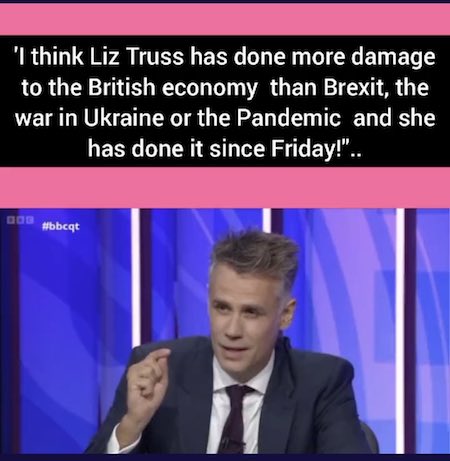

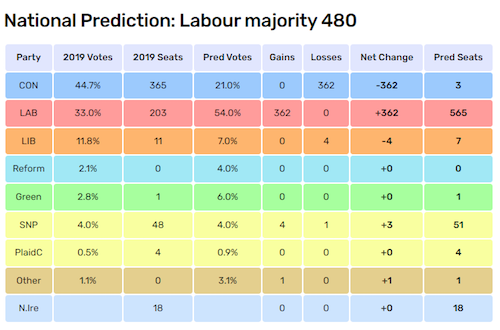

The UN owns the science
Melissa Fleming Under-Secretary-General for Global Communications at the UN tells WEF's 'Tackling Disinformation' panel, "We own the science, and we think that the world should know it"
Source: https://t.co/JEkxCkh1X8 pic.twitter.com/YapsEcKBtV— Wittgenstein (@backtolife_2023) September 30, 2022

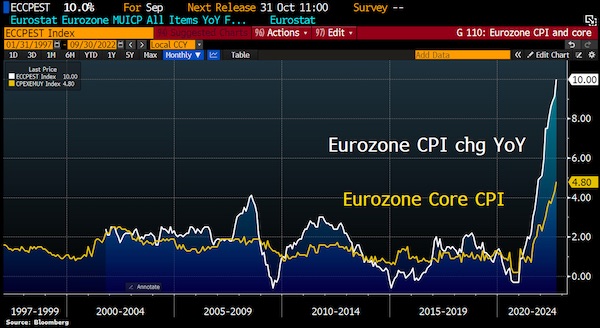

Netherlands inflation 17.1% in September.
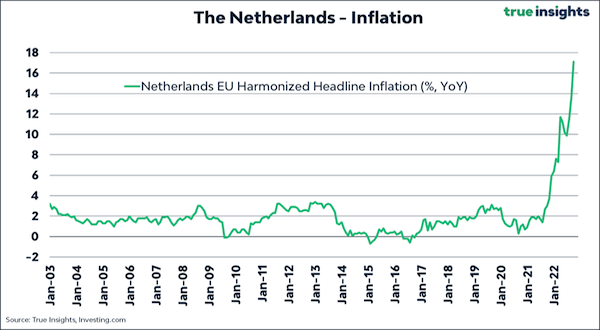

Oliver Stone
'If you're in London, England on October 8, go out and march in this planned demonstration #SurroundingParliament in support of Julian Assange' @TheOliverStone #HumanChain #FreeAssangeNOW
Sign up: https://t.co/fhWzocPPES pic.twitter.com/EQRHpZfTIJ— Don't Extradite Assange – #FreeAssange (@DEAcampaign) September 30, 2022


“The Minsk I and II agreements that followed required Ukraine to give those Donbas oblasts significant autonomy. The United Nations Security Council acknowledged and supported the agreements.”
• Ukraine – Four Oblasts Join Russia (MoA)
In 1922 Vladimir Il’ich Lenin, head of the revolutionary Union of Soviet Socialist Republics, decided that several regions which for centuries had been Russian and under Russian rule were to be put, for reasons unknown, under the administration of the Soviet Socialist Republic of Ukraine. In 1954 a similar decision was taken with regards to autonomous republic of Crimea. The sudden disintegration of the Union in 1991 led to unruly phases in the newly created republics. Ethnic Russian people suddenly found themselves in territory that was no longer ruled by Moscow. In several of the new countries ethnic non-Russian majorities started to suppress the Russian minorities. Today’s Baltic countries, Estonia, Latvia and Lithuania, are to various degrees prime examples for this.
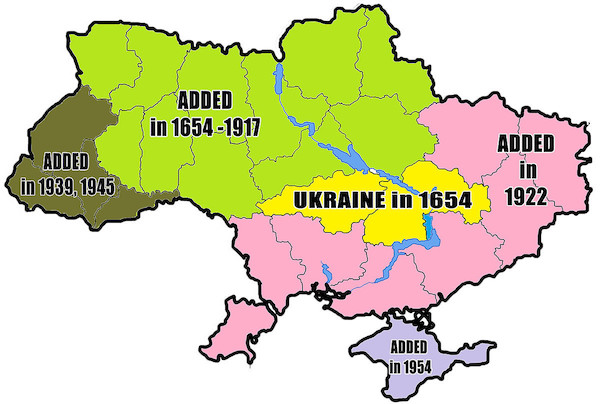
Before 1991 the Ukraine had never existed as a state or independent entity. The early Cossack tribes in the yellow part and green parts of the map had asked for Russian protection against attacks from Poland, Lithuania and other neighbors. In the new Ukraine ethnic Russians were nearly half of the population and the parties they supported managed to win several countrywide elections. Big voting differences were visible along regional/ethnic lines. The country had strong economic relations with Russia. Its industry depended on Russian gas while nearly all its machine and steel exports went to Russia. The U.S. did not like that. It wanted to control rule the Ukraine to be able to put pressure on Russia.
It twice, in 2004 and in 2014, organized ‘color revolutions’ to overthrow elected Ukrainian governments which, for mostly economic reasons, tended to favor relations with Russia. The 2014 color revolution was exceptionally brutal. The U.S. had organized extreme right wing groups to take the lead in violent protests. (The same groups were in the early 1940s allied with German Nazis and, between 1948 and 1952, were waging a CIA led guerrilla war against the Soviet Union.) The street fighting ended with an unconstitutional change of the government of Ukraine. The first law that the new coup government implemented was a rejection of Russian as one of Ukraine’s state languages. For some 50% of Ukrainians Russian is their daily language. Ukrainian itself is a Russian dialect. Nearly 100% of Ukrainians understand Russian.
The ethnic Russian people in Ukraine feared being canceled. Crimea, which in 1991 had voted for and declared its independence before the Ukraine did so, voted, under Russian protection, to join Russia. Moscow accepted the move. People in other former Russian parts of Ukraine protested and a some in the east took up arms. They twice defeated the Ukrainian army and volunteer formations sent against them. The Minsk I and II agreements that followed required Ukraine to give those Donbas oblasts significant autonomy. The United Nations Security Council acknowledged and supported the agreements. But any attempts to implement them were sabotaged by the U.S. via the armed right wing movements that had control over the government in Kiev.

Done deal. Fait accompli.
• Putin Speaks To Massive Crowd Celebrating New Territories (RT)
Russian President Vladimir Putin on Friday evening addressed thousands of people gathered on Moscow’s Red Square to celebrate the beginning of the process to incorporate four former Ukrainian regions that voted overwhelmingly to join Russia. Putin’s emotional speech came just hours after he signed treaties on the inclusion of the Donetsk and Lugansk People’s Republics, as well as Kherson and Zaporozhye Regions, into the Russian Federation. The signing ceremony marked the start of the formal process of accession, which will entail the treaties being reviewed by the Constitutional Court and by both chambers of the parliament. Claiming it was Russia that originally “created modern Ukraine” by transferring Moscow’s “historical territories” to it, Putin said modern Russia had now given people in those regions “the right to choose.”
“People came to the referendum and made their choice: to be with their historical motherland, with Russia,” he said to applause from the crowd. For decades, Putin claimed, the Ukrainian authorities had unsuccessfully tried to eradicate people’s “historical identity,” to destroy their traditions and forbid them from speaking their native language. “These people carried love for their historical homeland in their hearts and passed it on to their children,” the president said, adding that Russia was not only opening its doors, but was “opening its heart” to them. “Welcome home,” he said, prompting chants of ‘Russia’ from the crowd. Putin also used the address to make several pledges: to improve security in the new territories, to revive their economies and to build schools and hospitals.
“We became stronger because we are together. The truth is behind us, and truth means strength, and thus victory. Victory will be ours,” Putin said in conclusion, before shaking hands with the heads of the regions, who joined him on the stage. Meanwhile, on Thursday, on the eve of what Putin described as a “historic day,” UN Secretary-General Antonio Guterres called on the Kremlin “to step back from the brink” and to stop the “annexation” of the four Ukrainian regions. Guterres also warned Russia that neither the inclusion of new territories into Russia, nor the results of their referendums would be recognized as legal. Moscow, in turn, accused the secretary-general of abusing his power by making political statements on behalf of the UN.
Putin speech

“..the Russian high command intentionally weakened their line in this particular area in order to entice the NATO commanders of this newly created army to attack precisely where they did..”
It is also indisputably established that the Russians had, in the weeks preceding the Ukrainian attack, significantly reduced the density of men and equipment in the geographic triangle formed by the Seversky Donets River running northwest to southeast, and the Oskol River running north to south. The confluence of these two rivers is immediately southeast of Izyum, with the transportation hub of Kupyansk straddling the Oskol to the north, and Andreevka on the left bank of the Seversky Donets to the northwest. The Russians had left small but satisfactorily supplied formations of Donbass militia and Rosgvardia (Russian National Guard), covered by relatively potent long-distance artillery fire, modest close air support, and occasional precision missile strikes against concentrations of Ukrainian forces.
[..] I remain persuaded the Russian high command intentionally weakened their line in this particular area in order to entice the NATO commanders of this newly created army to attack precisely where they did, and then to deliberately lead them into the triangular pocket defined by the two rivers, as described above. My argumentation supporting this view is as follows: First of all, it must be kept in mind that, from the very beginning of this now three-week-long battle, the Russian forces defending the area in question have been outnumbered at least 5:1 at almost every juncture. It is absurd to believe this disparity in force numbers was not anticipated by Russian commanders, and a battle plan conceived to exploit the geography and the inherent firepower superiority of the defending force so as to conduct a punishing tactical retreat.
And, in retrospect, it is now plainly evident that is precisely what they have done. Contrary to the ridiculously exaggerated tales of a disorderly Russian retreat – with a thousand destroyed/abandoned tanks and armored vehicles, thousands of casualties, and ten thousand captured (yes, numbers such as these were breathlessly reported by western “expert analysts” in the first week of the battle!) – the Russian forces conducted a remarkably disciplined fighting retreat, progressed through multiple prepared lines of defense, and exacted severe losses on Ukrainian men and equipment every step of the way, while suffering relatively modest losses themselves.
Yes, several towns and villages were briefly defended and then abandoned along the way. In each case, the Ukrainian propagandists and their western media allies trumpeted the glorious victories, but none of these stories of supposed martial brilliance bothered to mention the exorbitant price being paid for the modest pieces of real estate they claim to have “liberated”. Nor have the subsequent “filtration” purges of “Russian collaborators” in each of these towns and villages been reported in the completely one-sided western media accounts. Instead, western audiences were once again treated to evidence-free atrocity tales of barbaric Russian troops engaging in wanton rapes, murders, plunder, torture, indiscriminate massacres, and mass graves of innocent civilians.
Macgregor

“..to maintain the flimsy pretense that NATO had any actual stake in whatever happens in Ukraine — as the result of the dumpster fire set there by America.”
• Slouching Toward Endgame (Jim Kunstler)
Not many weeks ago German foreign minister Annalena Baerbock told the world that Germany would support Ukraine (and US-driven NATO policy) “no matter what German voters think.” That was all for show, you understand, to maintain the flimsy pretense that NATO had any actual stake in whatever happens in Ukraine — as the result of the dumpster fire set there by America. At the same time, that very same German foreign ministry was sneaking through back channels to feel out the Russian foreign ministry on ways Germany might get Russian natgas on the down-low, through third parties, say, Turkey, buying time until the glorious day those Nord Stream pipelines might re-open and the former normality of German economic life would resume?
“Joe Biden” slammed the door on that pretty conclusively Monday, blowing up the two pipelines, a premier act of insanity by a US government fueled at every level and in every direction by psychotic strategic thinking. For starters, consider that the Nord Stream sabotage amounts to the leading member of NATO committing an act-of-war against the rest of NATO. What else do you call depriving most of Europe the means to make a living — or merely to stay alive? As it happens, Germany is in no position to answer this casus belli by going to war against the USA. Germany has a Potemkin military — America has made sure of that since 1945, the last time these Teutons of northern forests went batshit crazy against Western Civ.
Seems to me that either Chancellor Olaf Scholz acknowledges this deadly affront to Germany and negates further participation in the NATO Ukraine idiocy, OR, within a few months he will face violent political uprising from his own people and his government will fall — and not necessarily within the framework of any orderly parliamentary procedure. More like mobs in the streets… chaos… government buildings torched… officials strung-up — real insurrection, not the fake kind we hear about endlessly from the American Party of Chaos. How, exactly, do any of the major NATO countries continue to regard the USA as any kind of ally? They won’t and they can’t.
Anyway, and despite the recent panicked expansion of NATO, member countries of the adjoining scaffold known as the European Union are peeling off one-by-one. Georgia Meloni, soon to be Prime Minister of Italy, couldn’t have put it more plainly when her coalition won last week’s election: she and they oppose in the strongest terms all the Woke nonsense that the World Economic Forum has programmed into the EU. She and they are against the cancellation of individual liberties and tyrannical affronts to due process of law; are against the degenerate campaign to undermine family, church, and national sovereignty; and are unwilling to act as a dumping ground for anymore Third World hordes the EU stupidly induces to come to Europe’s shores.
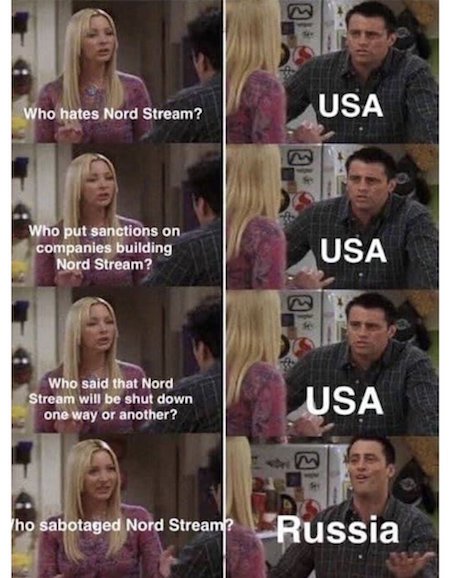

“..Kiev refused to meet its responsibilities, particularly on the question of federalization, unless its troops were given control of the Donbass regions’ borders with Russia. This ran contrary to the terms of the Minsk agreements.”
• Long Way Home: How Former Ukrainian Regions Joined Russia (RT)
Maidan In late 2013, a wave of street protest began in Kiev, ostensibly sparked by the government of Viktor Yanukovich shunning an economic agreement with the EU – a deal sold to Ukrainians as a harbinger of immediate social and economic benefits. As weeks of determined protest stretched into months, the so-called Maidan demonstrations were hijacked by radical nationalists, resulting in violent clashes with security forces in which dozens died. International politicians lent their support to the protests, with senior US diplomats famously handing out cookies in central Kiev. The emboldened movement gathered momentum and, despite a power-sharing deal mediated in February 2014 by Russia, Germany, France and Poland, escalating violence forced then-President Viktor Yanukovich to flee. The US-backed coup in the capital rallied the radical forces, who resorted to openly threatening the pro-Russian population in Ukraine with violence if they dared oppose the newly-installed authorities in Kiev.
Minsk agreements The Crimean Peninsula had strong historic ties with Russia, having been transferred to Kiev’s control only in 1954 under Soviet leader Nikita Krushchev. The region is essential for Russia’s national security as its deep harbours host the Black Sea naval Fleet. In a daring operation that was thought to have eventually prevented significant bloodshed, Moscow deployed special forces across the peninsula, and local authorities held a referendum on breaking with Ukraine and joining Russia. Moscow formally accepted Crimea’s bid in March 2014. The situation with two Donbass regions developed differently. In mid-April 2014, Kiev sent the military to quash protests in Donetsk and Lugansk. Protesters responded by forming militias and fighting back, militarising an already inflamed conflict.
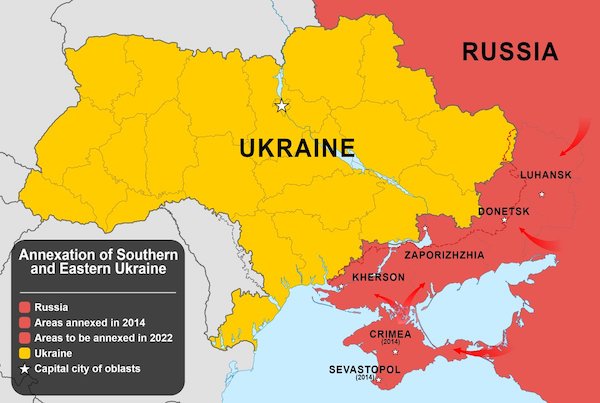
The following month, the two regions held referendums on declaring their independence. The conflict in eastern Ukraine sank into a stalemate after the Ukrainian military suffered serious losses to what Kiev claimed were Russian troops secretly fighting in Donbass. The warring parties agreed to a ceasefire and a reconciliation roadmap, formalized in two agreements signed in Minsk in 2014 and 2015 respectively, was agreed to. The peace plan never fully worked. While hostilities in Donbass dwindled, Kiev refused to meet its responsibilities, particularly on the question of federalization, unless its troops were given control of the Donbass regions’ borders with Russia. This ran contrary to the terms of the Minsk agreements. Former Ukrainian President Pyotr Poroshenko acknowledged in June that he agreed to the ceasefire only to win time to rebuild the Ukrainian military.
NATO encroachment The tension over Ukraine escalated in 2021, after Russia accused NATO of expanding into the country without formally admitting Kiev into the alliance. Moscow had for decades made clear that Ukraine’s would-be membership in the US-led bloc would be crossing Russia’s security red line. Moscow sought guarantees from Washington that would have addressed its concerns. However, US officials declared that NATO’s “open door” policy meant that Ukraine was free to defend itself as it wished. Kiev enshrined the goal of becoming a member of the military bloc in its constitution in 2019. Since then NATO members have intensively trained Ukrainian troops, providing Kiev with weapons and otherwise helping to field a more capable army. Over the same period, Ukrainian neo-Nazi groups became embedded into military structures, gaining political power well beyond their levels public support, given the results of elections held in 2019 and 2020.

This Czech sees a cheap opportunity. One problem: “The distance between Prague and the city of Kaliningrad is around 660km.”
• Czech MEP Wants Russian Region Split Between Two EU States (RT)
A long-time European Parliament member from the Czech Republic, Tomas Zdechovsky, has supported an idea posted by a blogger of separating the Russian exclave of Kaliningrad from Moscow and splitting it between Prague and Warsaw. On Thursday, Zdechovsky shared a tweet from a Polish blogger showing a map of Russia’s westernmost Kaliningrad Region being split between Poland and the Czech Republic. The caption to the image read: “It’s time to divide Kaliningrad, so that our Czech brothers finally have access to the sea.” The Czech politician, who has been an MEP since 2014, even suggested a plan for how to have the region removed from Russia. “We will hold a referendum to make Kaliningrad Czech-Polish,” he wrote, adding that “instructions” on organizing a vote could be taken from Crimea.
The peninsula decided to become part of Russia in the wake of a 2014 referendum following the US-backed overthrow of the democratically-elected government of Viktor Yanukovich in Kiev. On Tuesday, referendums on whether to join Russia concluded in Zaporozhye and Kherson Regions, which declared independence from Ukraine, and the Lugansk and Donetsk People’s Republics in Donbass. The residents in all of the territories overwhelmingly supported joining Russia. On Friday, Russian President Vladimir Putin is expected to sign treaties on incorporating the four new constituent members into the Russian state. The treaties have yet to be approved by the parliament. Kaliningrad is sandwiched between Poland and Lithuania and the Baltic Sea and doesn’t share a border with the Czech Republic. The distance between Prague and the city of Kaliningrad is around 660km.

“..you can’t feed anyone with paper, you need food.”
• Putin Slams Western Money Printing (RT)
Paper money printed up by Western nations will not heat homes or feed anyone in the world, Russian President Vladimir Putin said on Friday. “People cannot be fed with printed dollars and euros, they cannot be fed with these pieces of paper,” Putin said during the ceremony for the accession of the two Donbass republics and the Kherson and Zaporozhye regions into Russia. “All this is important, what I’m talking about, but what was just said is no less important – you can’t feed anyone with paper, you need food.” The president noted that EU politicians have been trying to convince people to eat less, wash up less, and dress warmer in their homes to conserve energy.
“And those who start asking fair questions on why this is so are immediately declared enemies, extremists, and radicals,” he said. Putin also reiterated his criticism of the Ukrainian grain deal mediated by the UN and Türkiye, which allows Kiev to export food via the Black Sea, saying it is not working as intended, as the shipments do little to alleviate food shortages in needy nations. “They are now exporting bread from Ukraine… under the pretext of ensuring food security for the poorest countries in the world. Where does it go? … everything goes to the same European countries, with only 5% sent to the poorest countries in the world. Again, another swindle and outright deception

The EU won’t exist in its present form by next winter.
• This Winter Will Be Hard But Next One Will Be Even Worse – EU (RT)
EU energy officials are concerned about the effects the ongoing energy crisis in Europe will have on the continent once cold weather sets in, Commissioner Kadri Simson told journalists on Friday. “Ministers were concerned, as am I, that this will not be an easy winter for us, and the next winter will be even more difficult,” said Simson during a press conference after an extraordinary meeting of EU energy ministers. The meeting was meant to address the skyrocketing gas prices in Europe and to develop a package of emergency measures aimed at assisting European households and businesses amid the crisis.
The agreed-upon steps include placing a cap on energy company revenues and distributing excess profits back to consumers. The plan also prescribes mandatory energy savings, requiring EU members to cut energy demand during peak hours by 5% and suggesting a 10% reduction in overall electricity use. The ministers failed, however, to agree on a price cap on wholesale natural gas, which was one of the key demands issued to the European Commission by a group of 15 EU member states ahead of the meeting. In a joint letter, the group argued that a price cap was the one measure that could help the bloc “mitigate the inflationary pressure, manage expectations and provide a framework in case of potential supply disruptions.”
While the European Commission has not completely ruled out the possibility of a price cap on natural gas, it has warned that such a move would weaken the bloc’s ability to secure gas supplies in the global market. The issue will reportedly be discussed at a later date, according to Lithuanian Energy Minister Dainius Kreivys. As Russian gas deliveries to the EU have declined by as much as 48% this year, according to Gazprom, inflation in the Eurozone has since hit double digits for the first time in recent history. It’s feared the situation will further deteriorate after the Russian Nord Stream pipelines suffered damage in a suspected act of sabotage earlier this week, which will severely limit potential gas deliveries to the bloc in the near future.
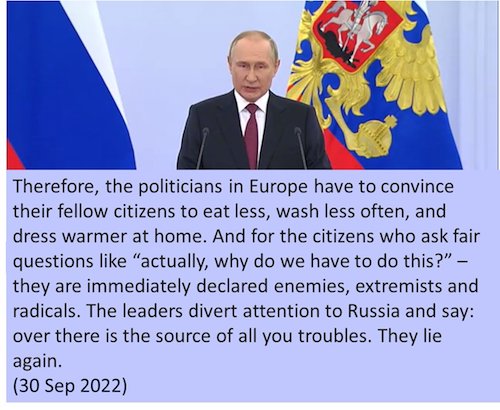

“..all trapped in a newly declared country in which they didn’t especially wish to reside.”
• Washington’s Pointless War On Behalf Of A Fake Nation (Stockman)
During the next 250 years the expansionist Czars annexed more and more of the adjacent territory, designating the eastern and southern regions as “Novorussiya” (New Russia), which territories included Catherine the Great’s purchase of Crimea from the Ottomans in 1783. That is to say, at the time of America’s own independence the heart of today’s Ukraine was ruled by the long arm of Czarist autocracy. After the Bolshevik revolution, of course, the map changed radically. In 1919 Lenin created the socialist state of Ukraine on part of the territory of the former Russian Empire. Ukraine officially became the Ukrainian People’s Republic with the capital of Kharkov in 1922 (moved to Kiev in 1934).
Accordingly, the new communist state swallowed up Novorussiya per the eastern and southern portions of the green area in the map below, including Donetsk, and Lugansk regions, as well as the Kherson and Zaporizhzhia regions bordering the Sea of Azov and the Black Sea that are the sites of today’s Russia-sponsored succession referendums. Then in 1939, as a result of the infamous Nazi-Soviet Pact, Stalin annexed the eastern territories of Poland, as designated by the yellow areas of the map. Thus, the historic territory of Galicia and the Polish city of Lvov were incorporated into Ukraine by the joint decree of Stalin and Hitler. In June of 1940, Stalin next annexed Northern Bukovina (brown area) from Romania. And then at the Yalta conference in 1945, upon Stalin’s insistence to Churchill and Roosevelt, the Hungarian Carpathian Ruthenia was incorporated into the Soviet Union and added to Ukraine.
Taken together, these Stalinist seizures are now known as Western Ukraine, the peoples of which understandably do not cotton to things Russian. At the same time, the 85% Russian-speaking population inhabiting the purple area (Crimea) was gifted to Ukraine by Khrushchev in 1954 for the very reason of extending his own accession to the communist dictatorship. Nevertheless, after the disintegration of the Soviet Union, Ukraine inherited these communist-confected borders within which there were upwards of 40 millions Russians, Poles, Hungarians, Romanians, Tartars and countless lesser nationalities—all trapped in a newly declared country in which they didn’t especially wish to reside.
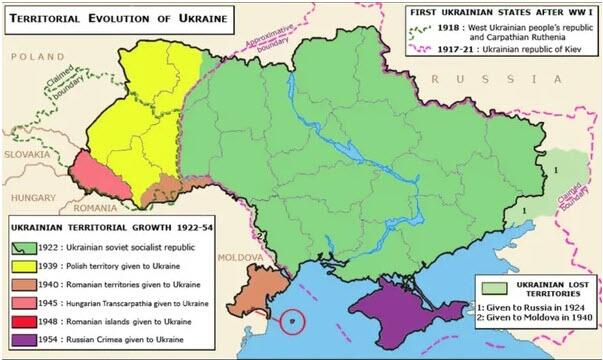

“..you are intentionally pushing us to use the right of the veto in order to then wax lyrical about the fact that Russia abuses this right..”
• India, China, Brazil Abstain From UN Vote Condemning Russian Annexation (ZH)
Russia on Friday vetoed a Western bid to condemn its annexations of four occupied Ukrainian regions following controversial referendums – and while this move was expected from the Kremlin, China, India, Brazil and Gabon abstained.Russia’s veto came after the United States and Ukraine co-sponsored the resolution hours after Russian President Vladimir Putin announced that Moscow would take over areas of Ukraine seized during the invasion following referendums organized by the Kremlin.
“This is exactly what the Security Council was made to do. Defend sovereignty, protect territorial integrity, promote peace and security,” said US ambassador to the United Nations, Linda Thomas-Greenfield, adding “The United Nations was built on an idea that never again would one country be allowed to take another’s territory by force.” Russian ambassador Vassily Nebenzia said that it was unprecedented to try and condemn a permanent member of the Security Council. “Do you seriously expect Russia to consider and support such a draft? And if not, then it turns out that you are intentionally pushing us to use the right of the veto in order to then wax lyrical about the fact that Russia abuses this right,” he said.

They don’t care about condemning an annexation. This is what UN nations really want.
• 66 Nations at UN Say ‘End War in Ukraine’ (CN)
We have spent the past week reading and listening to speeches by world leaders at the U.N. General Assembly in New York. Most of them condemned Russia’s invasion of Ukraine as a violation of the U.N. Charter and a serious setback for the peaceful world order that is the U.N.’s founding and defining principle. But what has not been reported in the United States is that leaders from 66 countries, mainly from the Global South, also used their General Assembly speeches to call urgently for diplomacy to end the war in Ukraine through peaceful negotiations, as the U.N. Charter requires. We have compiled excerpts from the speeches of all 66 countries to show the breadth and depth of their appeals, and we highlight a few of them here.
African leaders echoed one of the first speakers, Macky Sall, the president of Senegal, who also spoke in his capacity as the current chairman of the African Union when he said, “We call for de-escalation and a cessation of hostilities in Ukraine, as well as for a negotiated solution, to avoid the catastrophic risk of a potentially global conflict.” The 66 nations that called for peace in Ukraine make up more than a third of the countries in the world, and they represent most of the Earth’s population, including India,China, Indonesia, Bangladesh, Brazil and Mexico. While NATO and E.U. countries have rejected peace negotiations, and U.S. and U.K. leaders have actively undermined them, five European countries — Hungary, Malta, Portugal, San Marino and the Vatican — joined the calls for peace at the General Assembly.
The peace caucus also includes many of the small countries that have the most to lose from the failure of the U.N. system revealed by recent wars in Ukraine and the Greater Middle East, and who have the most to gain by strengthening the U.N. and enforcing the U.N. Charter to protect the weak and restrain the powerful. Philip Pierre, the prime minister of Saint Lucia, a small island state in the Caribbean, told the General Assembly, “Articles 2 and 33 of the U.N. Charter are unambiguous in binding Member States to refrain from the threat or use of force against the territorial integrity or political independence of any state and to negotiate and settle all international disputes by peaceful means. …We therefore call upon all parties involved to immediately end the conflict in Ukraine, by undertaking immediate negotiations to permanently settle all disputes in accordance with the principles of the United Nations.”
Global South leaders lamented the breakdown of the U.N. system, not just in the war in Ukraine but throughout decades of war and economic coercion by the United States and its allies. President Jose Ramos-Horta of Timor-Leste directly challenged the West’s double standards, telling Western countries, “They should pause for a moment to reflect on the glaring contrast in their response to the wars elsewhere where women and children have died by the thousands from wars and starvation. The response to our beloved secretary-general’s cries for help in these situations have not met with equal compassion. As countries in the Global South, we see double standards. Our public opinion does not see the Ukraine war the same way it is seen in the North.”

“Kremlin press secretary Dmitry Peskov reiterated on Friday that Moscow would from now on treat any attack on those territories as an attack against Russia itself.”
• Ukraine Insists It Can Strike Russia Despite US Ban (RT)
The US only forbids Kiev’s forces from attacking Russian territory with HIMARS (High Mobility Artillery Rocket Systems), not all American weapons, Ukrainian ambassador to Washington Oksana Markarova has said on Thursday. The US has been Kiev’s main backer during the conflict with Moscow, providing Ukrainian forces with billions of dollars worth of military aid, including sophisticated hardware such as HIMARS multiple rocket launchers, M777 howitzers, and combat drones. Last month, Ukrainian Defense Minister Aleksey Reznikov said that Kiev had “agreements with the US that we will not use weapons provided to us by the US and partners on the territory of Russia”due to Washington’s concern that it could escalate the fighting even further.
During her interview with Ukrainska Pravda, Markarova was asked if the US ban covered all weapons sent by Washington to Kiev. The ambassador responded by clarifying that “this applies specifically to HIMARS,” but not other American hardware. She also insisted that HIMARS could still be used by Kiev against Crimea as “it was, is and will be Ukraine.” The peninsula overwhelmingly voted to become part of Russia in a referendum in 2014, with Ukrainian leadership vowing to reclaim control on numerous occasions. Crimea has been targeted with drone attacks during the ongoing conflict and several explosions at military facilities on the peninsula have been attributed to Ukrainian saboteurs. On Friday, Russian President Vladimir Putin signed treaties on accepting the two Donbass republics, as well as Kherson and Zaporozhye Regions, which declared independence from Ukraine, into the Russian state.
Residents of those territories voted in referendums, which concluded on Monday, to join Russia. The treaties now await their ratification by the parliament. US Secretary of State Anthony Blinken said earlier this week that Washington “will never recognize the annexation of Ukrainian territory by Russia” and therefore would have no objections to Ukraine using American weapons in Donbass, Kherson and Zaporozhye Regions though Kiev’s attacks on the regions have regularly resulted in civilian deaths. Kremlin press secretary Dmitry Peskov reiterated on Friday that Moscow would from now on treat any attack on those territories as an attack against Russia itself. Moscow has long criticized the deliveries of weapons to Ukraine by the US and its allies, arguing that it only escalates the fighting and increases the risk of a direct confrontation between Russia and NATO.

Zelensky ignored the Minsk agreements. That’s all.
• Zelensky Sets Conditions For Talks With Russia (RT)
Ukrainian President Vladimir Zelensky has refused to negotiate a peace settlement as long as Vladimir Putin remains president of Russia, issuing a regime change demand via his official Telegram channel on Friday. Claiming he had “always offered Russia coexistence on equal, honest, dignified and fair terms,” Zelensky blamed Russia for the failure of negotiations, insisting that it was “obvious this is impossible with this Russian president.” “We are ready for a dialogue with Russia, but … with another president of Russia,” he wrote. Unlike the majority of his Telegram posts, this one was written only in Ukrainian, without an accompanying English translation. Zelensky has repeatedly rejected overtures of peace from Moscow, most recently turning down Putin’s offer on Friday to resume negotiations.
What made the offer a non-starter for Kiev is that Putin refused to relinquish the regions that voted this week to join Russia. “Only the path of strengthening Ukraine and expelling the occupiers from our entire territory will restore peace,”Zelensky declared in his address. Zelensky also confirmed that Ukraine had submitted an accelerated application to join NATO on Friday, something he previously admitted was probably never going to happen. While the Western media described the move as “more symbolic than practical,” the Ukrainian president seemed quite serious, arguing that Sweden and Finland were able to apply on an accelerated basis even without a Membership Action Plan and it was thus only “fair” that Ukraine do the same.
“De facto, we have already completed our path to NATO,” he said in another Telegram post. “De facto, we have already proven interoperability with the Alliance’s standards … We trust each other, we help each other and we protect each other.” Zelensky has previously acknowledged Ukraine might struggle to secure the consent of all 30 NATO member nations, pushing instead for the so-called Kiev Security Compact, which would oblige NATO’s core members to defend Ukraine “in case of aggression” while codifying the provision of bottomless military and financial aid as a stopgap measure.
Admitting Ukraine would draw NATO into immediate confrontation with Russia, under the Article 5 mutual defense provision. While the US is committed to the ‘open door’ policy when it comes to NATO, now is the wrong time to consider Ukraine’s membership application, President Joe Biden’s national security adviser, Jake Sullivan, said on Friday. The move would also make peace with Moscow impossible, as Putin has made it clear since before the military operation began in February that Ukraine must remain a neutral country under all circumstances.

“If the goal is to avoid a conflict in which we are already fighting, then does the rest of Washington’s approach to Russian aggression need to be reconsidered?”
• West and Russia Already Fighting WW3 – Fiona Hill (RT)
The West has been fighting World War III against Russia “for a long time” without being aware of it, former White House advisor Fiona Hill told the New Yorker magazine on Thursday. Moscow, however, is aware, with President Vladimir Putin accusing the collective West of waging “hybrid war” on Russia. “We’ve been in this for a long time, and we’ve failed to recognize it,” said Hill, who served in Donald Trump’s national security council before testifying against him during the 2019 impeachment inquiry. With the US backing a coup in Kiev in 2014 and supplying military aid to Ukraine while it waged war against the Donetsk and Lugansk People’s Republics in the eight years since, Hill suggested that Washington could reevaluate its stated policy of supporting Ukraine without becoming a direct party to the conflict.
“If the goal is to avoid a conflict in which we are already fighting, then does the rest of Washington’s approach to Russian aggression need to be reconsidered?” the New Yorker paraphrased her argument. While Hill did not directly call for the US to enter open war with Russia, other US lawmakers and former officials have. Shortly after Russian troops rolled into Ukraine in February, a group of these national security experts called on President Joe Biden to enforce a “no-fly zone” over Ukraine. Such a measure would see the US and any willing NATO allies commit to shooting down Russian aircraft, something Moscow has explicitly said it would perceive as an act of war.
Russia already considers itself at war with NATO in Ukraine, and Putin has vowed to use “all available means” to defend its own territory, including four former Ukrainian regions set to join the Russian Federation in the coming days. In a speech on Friday after signing accession treaties for these four regions, Putin accused the West of waging a “hybrid war” against Russia to prevent the development of a “multipolar world.”

“In the first lawsuit, the FBI produced no responsive documents. The parties knew the FBI had something, and so this sparked a second lawsuit – where the FBI somehow found 20,000 pages of potentially responsive documents.”
• Court Orders Production Of Seth Rich Laptop (Techno Fog)
Today, a federal judge ordered the FBI to “produce the information it possesses related to Seth Rich’s laptop.” This case involves a multi-year fight by attorney Ty Clevenger to obtain records relating to the FBI/DOJ investigation of Seth Rich, particularly whether Rich was involved in the hack of the DNC or had communicated with Wikileaks. This fight dates back to 2017 and includes two FOIA lawsuit. In the first lawsuit, the FBI produced no responsive documents. The parties knew the FBI had something, and so this sparked a second lawsuit – where the FBI somehow found 20,000 pages of potentially responsive documents. The court explains:

Of those 20,000 pages, the government found 1,596 pages of responsive documents, of which the government withheld 1,469 pages under various FOIA exemptions (privacy, law enforcement exemption, etc.). The FBI also withheld the contents of Seth Rich’s personal laptop, which it possesses, in its entirety, alleging the privacy of Rich’s family in “preventing the public release of this information” outweighs the public interest in disclosure. The court rejected that argument, stating “the FBI has not satisfied its burden of showing more than a de minimis privacy interest that would justify withholding information from Seth Rich’s laptop.” What will the laptop reveal? Time will tell. (Time is especially relevant becausethe DOJ will appeal and drag this out.)
What might be more interesting is the FBI’s complete records on Seth Rich. The FBI has fought production of those records – first by failing to “find” its own documents, and now by alleging documents must be withheld due to “national security grounds” and the “basis that disclosure of the information would threaten intelligence-gathering efforts.” The information in the FBI’s possession includes that which was “provided by foreign government agency authorities under an implied assurance of confidentiality.” It also may – or may not – include whether the FBI used a “code name” associated with Seth Rich. And, if FBI representations are to be believed, it also includes “details of intelligence activities, sources, and methods related to national security.”

1/ Tell him if he doesn’t show up, the deal is off.
2/ Tell Von der Leyen the same thing.
• Pfizer CEO Pulls Out Of Testifying To EU Parliament COVID Panel (Pol.eu)
Pfizer Chief Executive Albert Bourla has pulled out of an appointment to testify before the European Parliament’s special committee on COVID-19, at which he was expected to face tough questions on how secretive vaccine deals were struck. The decision follows an audit report into the EU’s vaccine procurement strategy published earlier in the month that raised new questions about contact between Bourla and European Commission President Ursula von der Leyen that preceded a multibillion-euro vaccine contract. The head of the U.S. pharmaceutical giant, the largest supplier of COVID-19 vaccines to the EU, was scheduled to appear before the panel on October 10. The committee is meeting with key officials involved in the EU’s vaccine procurement process to draw lessons on how to respond to future pandemics.
Other pharmaceutical executives have addressed the committee, including the CEO of Moderna and senior officials from AstraZeneca and Sanofi. The committee’s chair, Belgian MEP Kathleen Van Brempt, told POLITICO she “deeply regrets” the decision taken by Pfizer. After a visit to BioNTech’s headquarters last week, Van Brempt had said in a written statement that she looked forward to discussions “with other CEOs” including “Mr. Albert Bourla, the CEO of Pfizer” on October 10. The report, by the European Court of Auditors, found that von der Leyen had been directly involved in preliminary negotiations for the EU’s biggest vaccine contract, for up to 1.8 billion doses of the BioNTech/Pfizer vaccine, which was concluded in May 2021. This was a departure from the negotiating procedure followed with other contracts, where a joint negotiating team made up of officials from the Commission and member countries conducted exploratory talks.
The EU watchdog also noted that the Commission refused to provide records of the discussions with Pfizer, either in the form of minutes, names of experts consulted, agreed terms, or other evidence. Already in 2021, the New York Times reported on the seemingly-cozy relationship between Bourla and von der Leyen, with the two exchanging text messages in the run-up to the deal. Contacted by POLITICO, a spokesperson for Pfizer said the company’s president of international development markets, Janine Small, would attend the committee hearing. “She has been identified as best placed to support the committee in meeting their objectives,” the spokesperson said.


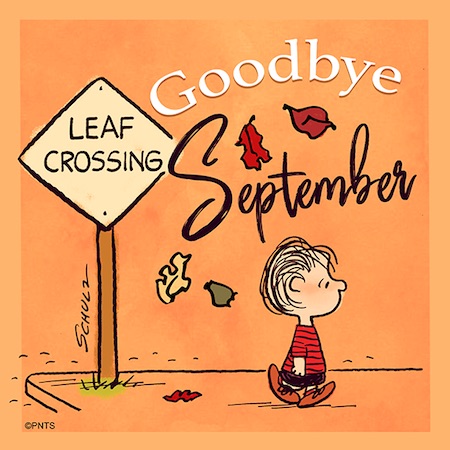

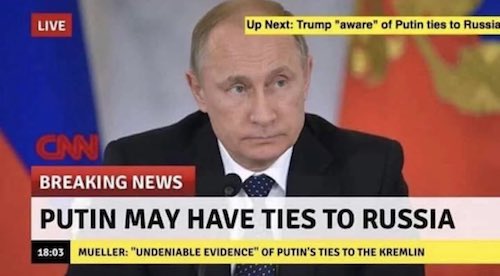

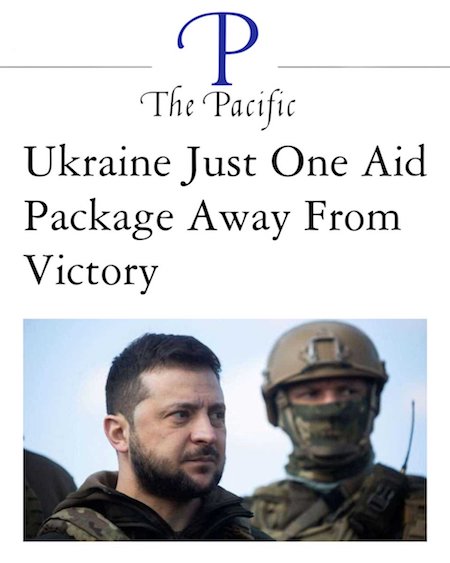

there’s some debate about what time signature it’s actually in. Musicologists say that riff is in 13/8 time, effectively switching from 3/4 to 4/4 for every fourth bar. Depending on who you talk to, the rest of the song is in 3/4 or 12/8, with that 13/8 weaving in and out.
https://twitter.com/i/status/1575560807278313472

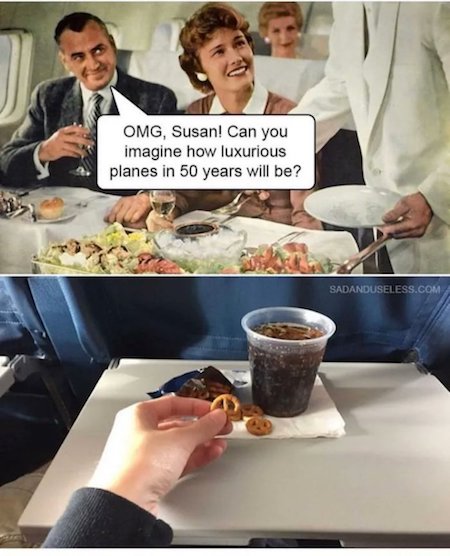


Support the Automatic Earth in virustime with Paypal, Bitcoin and Patreon.








